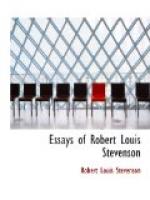[Note 20: Thoreau ... Hazlitt ... Penn ... Mitford’s Tales... Henry David Thoreau (1817-1862), the American naturalist and writer, whose works impressed Stevenson deeply. See the latter’s excellent essay on Thoreau (1880), in Familiar Studies of Men and Books.... Hazlitt, See Note 19 of Chapter II above. His paper, On the Spirit of Obligations, appeared in The Plain Speaker, 2 Vols., 1826. Penn, whose little book of aphorisms. This refers to William Penn’s famous book, Some Fruits of Solitude: in Reflections and Maxims relating to the Conduct of Human Life (1693). Edmund Gosse says, in his Introduction to a charming little edition of this book in 1900, “Stevenson had intended to make this book and its author the subject of one of his critical essays. In February 1880 he was preparing to begin it... He never found the opportunity... But it has left an indelible stamp on the tenor of his moral writings. The philosophy of B. L. S. ... is tinctured through and through with the honest, shrewd, and genial maxims of Penn.” Stevenson himself, in his Letters (Vol. I, pp. 232, 233), spoke of this little book in the highest terms of praise.]
[Note 21: Mitford’s Tales. Mary Russell Mitford (1787-1855), a novelist and dramatist who enjoyed an immense vogue. “Her inimitable series of country sketches, drawn from her own experiences at Three Mile Cross, entitled ‘Our Village,’ began to appear in 1819 in the ‘Lady’s Magazine,’ a little-known periodical, whose sale was thereby increased from 250 to 2,000. ... The sketches had an enormous success, and were collected in five volumes, published respectively in 1824, 1826, 1828, 1830, and 1832. ... The book may be said to have laid the foundation of a branch of literature hitherto untried. The sketches resemble Dutch paintings in their fidelity of detail.”—Dic. Nat. Biog.]
IX
PULVIS ET UMBRA
We look for some reward of our endeavors and are disappointed; not success, not happiness, not even peace of conscience, crowns our ineffectual efforts to do well. Our frailties are invincible, are virtues barren; the battle goes sore against us to the going down of the sun. The canting moralist tells us of right and wrong; and we look abroad, even on the face of our small earth, and find them change with every climate,[1] and no country where some action is not honoured for a virtue and none where it is not branded for a vice; and we look in our experience, and find no vital congruity in the wisest rules, but at the best a municipal fitness. It is not strange if we are tempted to despair of good. We ask too much. Our religions and moralities have been trimmed to flatter us, till they are all emasculate and sentimentalised, and only please and weaken. Truth is of a rougher strain. In the harsh face of life, faith can read a bracing gospel. The human race is a thing more ancient than the ten commandments; and the bones and revolutions of the Kosmos, in whose joints we are but moss and fungus, more ancient still.




